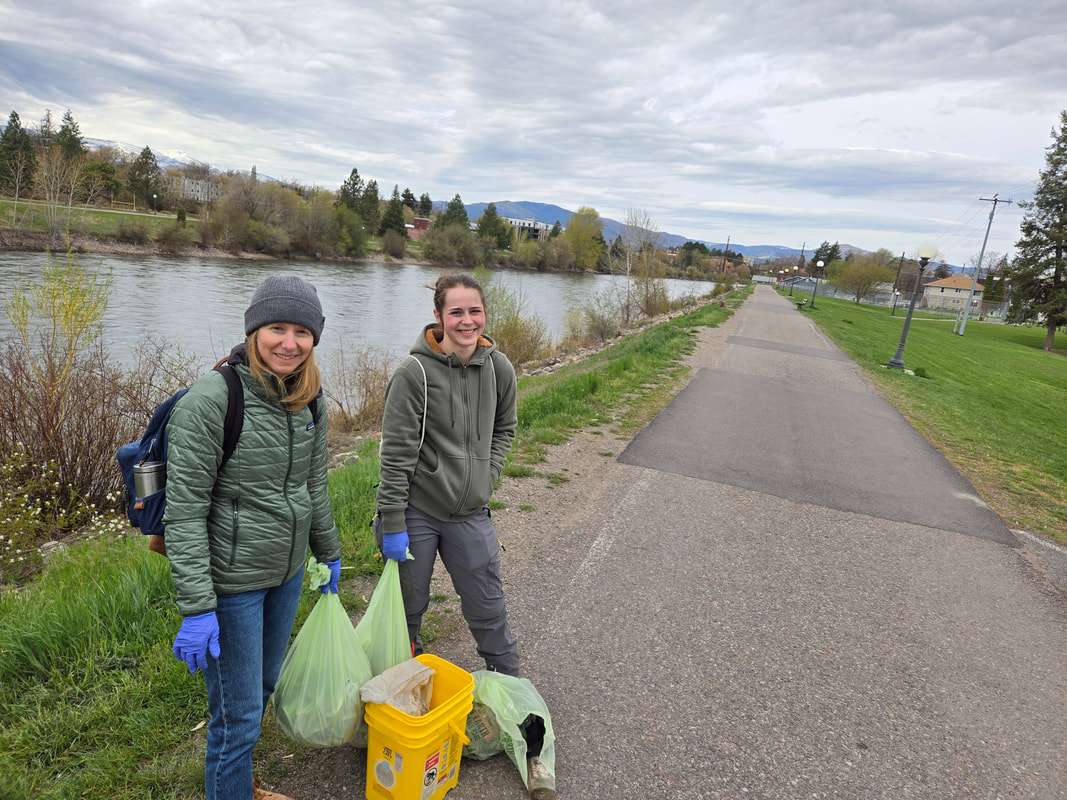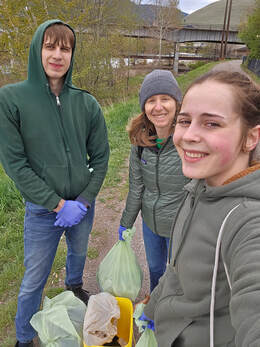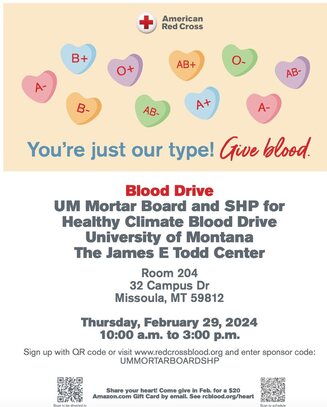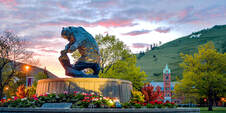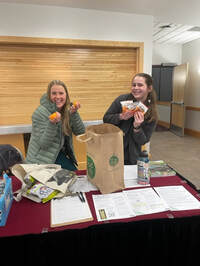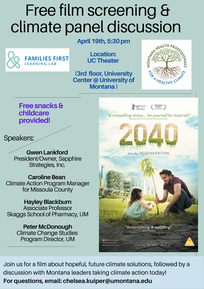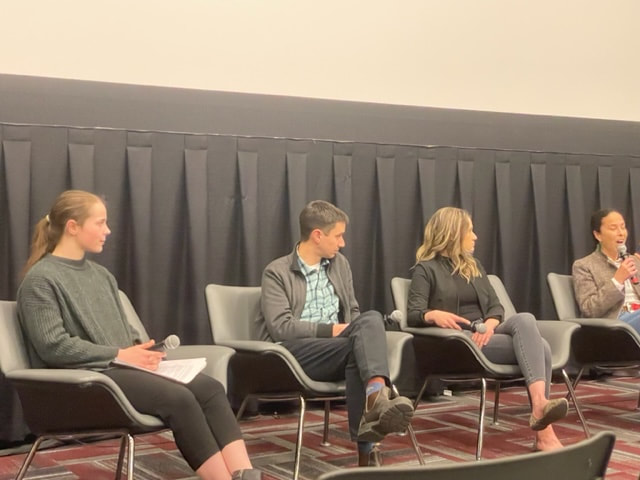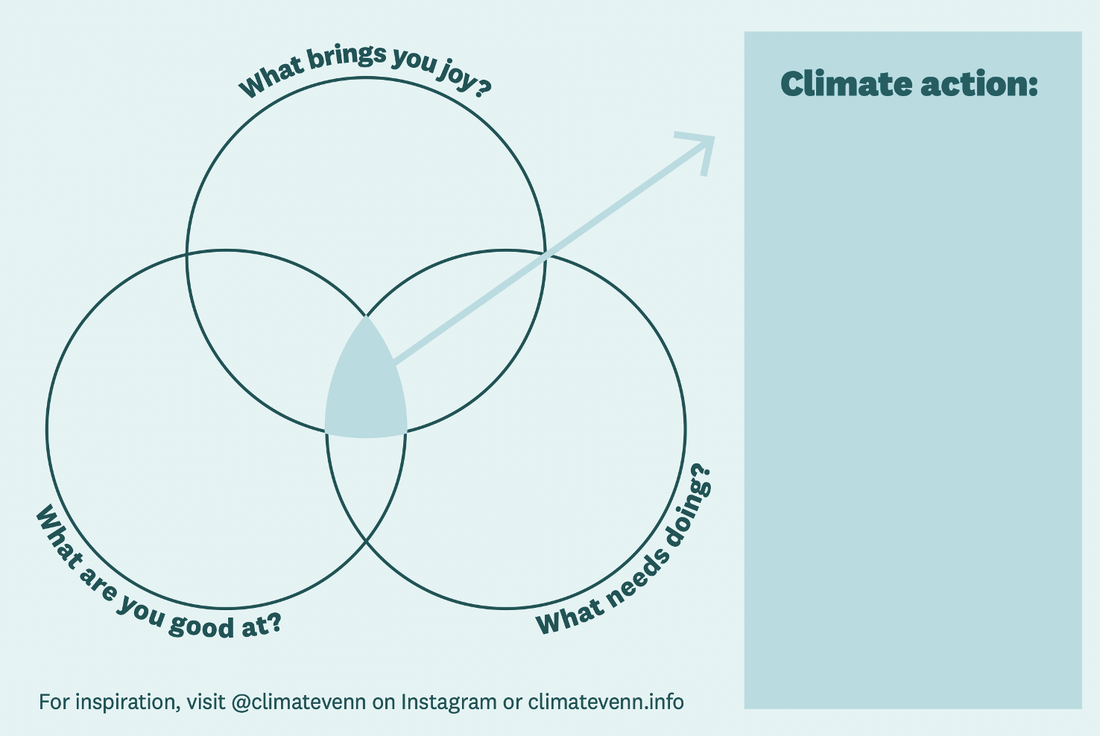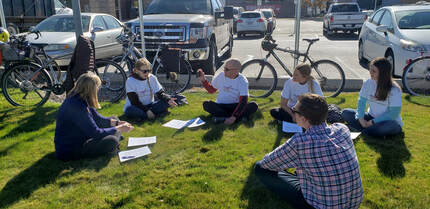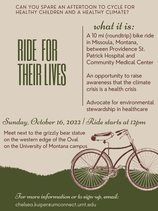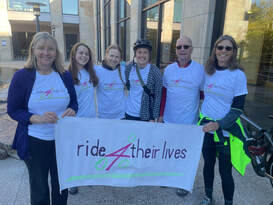Are you a student at another organization? Let's start a club at your school! Contact us to get started.
CLARK FORK CLEANUP April 2024
The UM Student Chapter of the MtHPHC organized an Earth Day cleanup of the Clark Fork. Small group with a mighty effort!
UM STUDENTS MARCH 2024
|
On February 29th, Student Health Professionals for a Healthy Climate partnered with the University of Montana Mortar Board Society to host a Blood Drive on the UM campus. This event was a great success! Nearly every donation spot was taken, with members of the community coming together to donate blood for a greater purpose. We thank the Missoula Community, the American Red Cross, and Mortar Board for making this possible.
Looking forward, Student Health Professionals plan to volunteer for the annual Clark Fork River Cleanup hosted by the Clark Fork Coalition. It will take place April 21st, from 9am to 1pm. This yearly effort cleans the riverbank of refuse before the snowmelt sweeps it away. This is a beloved Missoula event that boasts of hundreds of participants, and a BBQ lunch! The current focus for SHPHC is to gather volunteers for our team. |
UM STUDENTS AUGUST 2023
After a successful spring semester with the showing of “2040”, the summer has been more a time of rest and preparation for the fall semester. The next event that Student Health Professionals for a Healthy Climate will attend is the Bear Fair at the University of Montana Campus, reaching out to new incoming students to invite them to join in our efforts for climate advocacy.
On a larger scale, great leaps and bounds have been made for climate advocacy in light of the Held v Montana case. From June 16th to the 20th, this case was brought to the State court for consideration, with all 16 plaintiffs testifying about the impacts fossil fuel overuse has had upon their livelihoods. Now that the trial has concluded, Judge Seeley will consider the ruling of the case. A comprehensive summary of the trial and all its events can be found here
Full Trial Text here
On a larger scale, great leaps and bounds have been made for climate advocacy in light of the Held v Montana case. From June 16th to the 20th, this case was brought to the State court for consideration, with all 16 plaintiffs testifying about the impacts fossil fuel overuse has had upon their livelihoods. Now that the trial has concluded, Judge Seeley will consider the ruling of the case. A comprehensive summary of the trial and all its events can be found here
Full Trial Text here
UM STUDENTS APRIL 2023
Documentary showing and Panel Discussion
Film 2040, a hopeful film about agriculture and climate change, was shown to a community-wide event, with childcare provided by Families First Learning Labs.
Panelists Gwen Lankford, Caroline Bean, Hayley Blackburn, and Peter McDonough.
Student Corner Update – June 2023
The student chapter of Montana Health Professionals for a Healthy Climate had an eventful, uplifting spring semester of climate-engaged work at the University of Montana. In collaboration with Families First Learning Lab, our team hosted a screening of the documentary 2040 on April 19th, followed by a panel discussion with three local climate leaders in Missoula.
2040: An Exercise in Fact-based Dreaming
In 2019, award-winning (That Sugar Film, 2015) Australian filmmaker Damon Gameau (That Sugar Film, 2015) went on a global journey to meet changemakers to discover what the world could look like by the year 2040 if we embraced readily available solutions to create a healthier planet and rapidly scaled them into the mainstream. The film is a letter to his daughter, who was four years old at the time, and aimed at giving her a vision of an alternative future rather than a dystopian one. Drawing on innovators' insights with expertise in climate, economics, technology, civil society, education, agriculture, and sustainability, Gameau paints an optimistic portrait of what the world could be. The student chapter chose this film for its energizing, inspiring message. It is easy to fall into despair when considering the global climate crisis. However, what is unique about 2040 is that it is an exercise in what Gameau calls, 'fact-based dreaming.' Rather than paint a picture of a utopian fantasy, all the solutions he presents in the film already exist on the planet and are currently being implemented in some form. These solutions include strategies like marine permaculture, tools for raising community awareness about resource use, increasing educational access, and innovations in alternative energy technologies and transport systems. Overall, the filmmaker poses a compelling challenge: regenerating the planet is possible, and a future we must aspire to and believe is possible.
Panel discussion
Following the film, student chapter vice president, Isabelle Johnson, lead a panel discussion with local climate leaders Gwen Lankford (President/Owner, Sapphire Strategies, Inc.), Hayley Blackburn (Associate Professor, Skaggs School of Pharmacy at the University of Montana), and Peter McDonough (Climate Change Studies Program Director at the University of Montana).
Speaker Biographies:
Gwen Lankford: Gwen is on the board of directors of Climate Smart Missoula and is the President of Sapphire Strategies, Inc., a strategic communications firm in Missoula focusing on creating more understanding between disparate groups. She devotes much of her energy to assisting communities with resiliency planning and mitigation amid changes in climate. Gwen was born and raised in Missoula and is a member, is a member of the Gros Ventre Tribe of Fort Belnap and a direct descendent of the Salish Tribe.
(Adapted from Climate Smart Missoula website)
Hayley Blackburn: Hayley is on the board of directors of Montana Health Professionals for a Healthy Climate. She is a clinical pharmacist and Associate Professor at the Skaggs School of Pharmacy at the University of Montana. She is passionate about health professions education and multidisciplinary approaches to training and healthcare innovation, particularly at the intersection of climate change and human health in Montana. Dr. Blackburn is also a co-founder of Rx for Climate, an international web-based network promoting climate-smart pharmacy practice. (Adapted from Montana Health Professionals for a Healthy Climate website)
Peter McDonough: Peter is the Climate Change Studies Program Director at the University of Montana and teaches within the Davidson Honors College and Franke Global Leadership Initiative. He has introduced climate education courses on energy, climate solutions, human health, biomimicry, and more. He is one of the 2022 recipients of Climate Smart Missoula’s “Smarty Pants Awards” and a Doctorate of Dedication in honor of his dedication to his students. Peter holds a BS in Physics from the University of Puget Sound, an MS in Civil and Environmental Engineering from Stanford, and an MS in Environmental Studies from the University of Montana (Adapted from the University of Montana and Climate Smart Missoula).
Panel questions:
The questions developed by the student chapter and posed to the panelists were:
1. For so long, the conversation around the climate crisis has focused on the problems, not the solutions. Which solution from the film or other solutions could be implemented in Montana (or are we currently implementing) in our state? Are there any barriers to implementing these solutions, and how could we overcome those?
2. How could community members become more involved in supporting Missoula to improve its response to climate change? What can students do?
3. The filmmakers describe 2040 as an exercise in "fact-based dreaming," meaning that the hopeful vision of a climate-resilient future presented in the film is achievable versus one that we can easily dismiss as simply "unrealistic." What is your own 'fact-based dream' for a healthy Montana or Missoula a few decades from now? What does a climate-resilient Montana look like?
Panel discussion highlights from each speaker:
Gwen Lankford: Gwen emphasized the importance of horizontal rather than top-down solutions when addressing the climate crisis challenges. Explaining that the "future is indigenous," Gwen noted that indigenous people are in reciprocity with the landscape, engaging in horizontal solutions that bring people together. She noted that indigenous pathways and lenses are often taken out of conversations and how important it is to ensure indigenous voices are elevated in climate discussions.
She asked the audience to remember that if they love the landscapes of Montana, to understand that we reflect it. Understanding that we reflect the natural world around us means understanding that we all are part of reciprocal systems that connect ecosystems and people. Additionally, Gwen emphasized that climate change is a manifestation of our problems as people rather than the root issue.
For Gwen, one of the essential facets of addressing the climate crisis involves participating in our healing as people on an individual level. As she explained, until we each have a "firm grasp" on our own healing, it is challenging to do healing on the collective level through efforts like developing innovations to address the impacts of climate change. This healing involves understanding how "divine and exquisite" we are as human beings. Part of what makes us exquisite is that we come from the landscapes we are connected to. Honoring the exquisiteness in nature and within ourselves is a crucial aspect of healing on an individual level. When we participate in our healing, we can approach the challenge of coming together to regenerate our world.
Peter McDonough: A student in the audience asked the panelists to reflect on how their experiences and perspectives on climate change had evolved over time. Peter shared that he had not heard of climate change until 2006 when he was a sophomore in college. At that time, Peter wanted to design some of the first probes to go to Europa. Instead, he had the opportunity to go into the Peace Corps in Tanzania. He noted that, at the time, he was somewhat self-focused. However, seeing the impacts of climate change up close and seeing the world through the eyes of his high school students in Tanzania created a perspective shift for him. He understood that he wanted to do things for them and their future.
Peter highlighted an important point from the film: while the filmmaker highlights the availability of technology to implement climate innovations now, the social foundation that underlays these solutions is important. Peter noted that being able to see ourselves as part of a deep continuum and as interconnected is hard, as we are "asking people to do the hard thing at every possible level." We are asking people to critique how they "relate to the planet and each other." An example of this idea of doing the "hard thing" arose when Peter discussed being raised in the clergy. Growing up, he learned a hymn that explains that when things are difficult, will you do what is right, simply because it is right? For instance, most people have no career in climate change, as only some jobs specifically focus on addressing it. However, as Peter noted, "You have to take it into what you do" and "what you are passionate about."
Hayley Blackburn: Hayley pointed out that "climate change" can be an othering issue or term, as it diminishes our connection to the climate. Hayley noted that in her various professional roles, she often does not lead discussions with the word "climate." Instead, she asks people about the things around which they care most. To this point, Hayley noted that one way to engage in climate action is to find joy in it by aligning ourselves with efforts that reflect and are tailored to what we each uniquely care about as individuals. Hayley referenced Dr. Elizabeth Johnson's climate action diagrams. These tools are a strategy to map out what you're good at, what you enjoy doing or spending time on, determining what is needed, and finding the sweet spot in between all of these pieces that reflect your personal energy, passion, and capacity
For instructions and resources from Dr. Johnson on how to make a climate action diagram, click here. A free template of Dr. Johnson’s Venn diagram is provided on the website (above).
Hayley offered various practical solutions for those looking to engage in climate actions in their communities but may need help knowing where to start. While some might think an individual needs to be connected to stakeholders or organizations focused on addressing environmental change, the pathway to engaging in climate actions does not necessitate such formal channels. For instance, Hayley mentioned that if a person is connected to a community group that has never worked on climate before, but that individual wants to have an event to mobilize people, they should do that! Whatever one can contribute as an individual contributes to the strength of the collective. Additionally, completing the Venn diagram can initiate a reflective process that sets a person on a path for the future.
The student chapter of Montana Health Professionals for a Healthy Climate had an eventful, uplifting spring semester of climate-engaged work at the University of Montana. In collaboration with Families First Learning Lab, our team hosted a screening of the documentary 2040 on April 19th, followed by a panel discussion with three local climate leaders in Missoula.
2040: An Exercise in Fact-based Dreaming
In 2019, award-winning (That Sugar Film, 2015) Australian filmmaker Damon Gameau (That Sugar Film, 2015) went on a global journey to meet changemakers to discover what the world could look like by the year 2040 if we embraced readily available solutions to create a healthier planet and rapidly scaled them into the mainstream. The film is a letter to his daughter, who was four years old at the time, and aimed at giving her a vision of an alternative future rather than a dystopian one. Drawing on innovators' insights with expertise in climate, economics, technology, civil society, education, agriculture, and sustainability, Gameau paints an optimistic portrait of what the world could be. The student chapter chose this film for its energizing, inspiring message. It is easy to fall into despair when considering the global climate crisis. However, what is unique about 2040 is that it is an exercise in what Gameau calls, 'fact-based dreaming.' Rather than paint a picture of a utopian fantasy, all the solutions he presents in the film already exist on the planet and are currently being implemented in some form. These solutions include strategies like marine permaculture, tools for raising community awareness about resource use, increasing educational access, and innovations in alternative energy technologies and transport systems. Overall, the filmmaker poses a compelling challenge: regenerating the planet is possible, and a future we must aspire to and believe is possible.
Panel discussion
Following the film, student chapter vice president, Isabelle Johnson, lead a panel discussion with local climate leaders Gwen Lankford (President/Owner, Sapphire Strategies, Inc.), Hayley Blackburn (Associate Professor, Skaggs School of Pharmacy at the University of Montana), and Peter McDonough (Climate Change Studies Program Director at the University of Montana).
Speaker Biographies:
Gwen Lankford: Gwen is on the board of directors of Climate Smart Missoula and is the President of Sapphire Strategies, Inc., a strategic communications firm in Missoula focusing on creating more understanding between disparate groups. She devotes much of her energy to assisting communities with resiliency planning and mitigation amid changes in climate. Gwen was born and raised in Missoula and is a member, is a member of the Gros Ventre Tribe of Fort Belnap and a direct descendent of the Salish Tribe.
(Adapted from Climate Smart Missoula website)
Hayley Blackburn: Hayley is on the board of directors of Montana Health Professionals for a Healthy Climate. She is a clinical pharmacist and Associate Professor at the Skaggs School of Pharmacy at the University of Montana. She is passionate about health professions education and multidisciplinary approaches to training and healthcare innovation, particularly at the intersection of climate change and human health in Montana. Dr. Blackburn is also a co-founder of Rx for Climate, an international web-based network promoting climate-smart pharmacy practice. (Adapted from Montana Health Professionals for a Healthy Climate website)
Peter McDonough: Peter is the Climate Change Studies Program Director at the University of Montana and teaches within the Davidson Honors College and Franke Global Leadership Initiative. He has introduced climate education courses on energy, climate solutions, human health, biomimicry, and more. He is one of the 2022 recipients of Climate Smart Missoula’s “Smarty Pants Awards” and a Doctorate of Dedication in honor of his dedication to his students. Peter holds a BS in Physics from the University of Puget Sound, an MS in Civil and Environmental Engineering from Stanford, and an MS in Environmental Studies from the University of Montana (Adapted from the University of Montana and Climate Smart Missoula).
Panel questions:
The questions developed by the student chapter and posed to the panelists were:
1. For so long, the conversation around the climate crisis has focused on the problems, not the solutions. Which solution from the film or other solutions could be implemented in Montana (or are we currently implementing) in our state? Are there any barriers to implementing these solutions, and how could we overcome those?
2. How could community members become more involved in supporting Missoula to improve its response to climate change? What can students do?
3. The filmmakers describe 2040 as an exercise in "fact-based dreaming," meaning that the hopeful vision of a climate-resilient future presented in the film is achievable versus one that we can easily dismiss as simply "unrealistic." What is your own 'fact-based dream' for a healthy Montana or Missoula a few decades from now? What does a climate-resilient Montana look like?
Panel discussion highlights from each speaker:
Gwen Lankford: Gwen emphasized the importance of horizontal rather than top-down solutions when addressing the climate crisis challenges. Explaining that the "future is indigenous," Gwen noted that indigenous people are in reciprocity with the landscape, engaging in horizontal solutions that bring people together. She noted that indigenous pathways and lenses are often taken out of conversations and how important it is to ensure indigenous voices are elevated in climate discussions.
She asked the audience to remember that if they love the landscapes of Montana, to understand that we reflect it. Understanding that we reflect the natural world around us means understanding that we all are part of reciprocal systems that connect ecosystems and people. Additionally, Gwen emphasized that climate change is a manifestation of our problems as people rather than the root issue.
For Gwen, one of the essential facets of addressing the climate crisis involves participating in our healing as people on an individual level. As she explained, until we each have a "firm grasp" on our own healing, it is challenging to do healing on the collective level through efforts like developing innovations to address the impacts of climate change. This healing involves understanding how "divine and exquisite" we are as human beings. Part of what makes us exquisite is that we come from the landscapes we are connected to. Honoring the exquisiteness in nature and within ourselves is a crucial aspect of healing on an individual level. When we participate in our healing, we can approach the challenge of coming together to regenerate our world.
Peter McDonough: A student in the audience asked the panelists to reflect on how their experiences and perspectives on climate change had evolved over time. Peter shared that he had not heard of climate change until 2006 when he was a sophomore in college. At that time, Peter wanted to design some of the first probes to go to Europa. Instead, he had the opportunity to go into the Peace Corps in Tanzania. He noted that, at the time, he was somewhat self-focused. However, seeing the impacts of climate change up close and seeing the world through the eyes of his high school students in Tanzania created a perspective shift for him. He understood that he wanted to do things for them and their future.
Peter highlighted an important point from the film: while the filmmaker highlights the availability of technology to implement climate innovations now, the social foundation that underlays these solutions is important. Peter noted that being able to see ourselves as part of a deep continuum and as interconnected is hard, as we are "asking people to do the hard thing at every possible level." We are asking people to critique how they "relate to the planet and each other." An example of this idea of doing the "hard thing" arose when Peter discussed being raised in the clergy. Growing up, he learned a hymn that explains that when things are difficult, will you do what is right, simply because it is right? For instance, most people have no career in climate change, as only some jobs specifically focus on addressing it. However, as Peter noted, "You have to take it into what you do" and "what you are passionate about."
Hayley Blackburn: Hayley pointed out that "climate change" can be an othering issue or term, as it diminishes our connection to the climate. Hayley noted that in her various professional roles, she often does not lead discussions with the word "climate." Instead, she asks people about the things around which they care most. To this point, Hayley noted that one way to engage in climate action is to find joy in it by aligning ourselves with efforts that reflect and are tailored to what we each uniquely care about as individuals. Hayley referenced Dr. Elizabeth Johnson's climate action diagrams. These tools are a strategy to map out what you're good at, what you enjoy doing or spending time on, determining what is needed, and finding the sweet spot in between all of these pieces that reflect your personal energy, passion, and capacity
For instructions and resources from Dr. Johnson on how to make a climate action diagram, click here. A free template of Dr. Johnson’s Venn diagram is provided on the website (above).
Hayley offered various practical solutions for those looking to engage in climate actions in their communities but may need help knowing where to start. While some might think an individual needs to be connected to stakeholders or organizations focused on addressing environmental change, the pathway to engaging in climate actions does not necessitate such formal channels. For instance, Hayley mentioned that if a person is connected to a community group that has never worked on climate before, but that individual wants to have an event to mobilize people, they should do that! Whatever one can contribute as an individual contributes to the strength of the collective. Additionally, completing the Venn diagram can initiate a reflective process that sets a person on a path for the future.
UM STUDENTS OCTOBER 2022
Ride for their Lives
UM Students and other MtHPHC board members had a Ride for their Lives event in Missoula, biking to Providence Hospital and hearing from Sustainability Director Dr Beth Schenk, biking to community and hearing from participants about their climate journeys. TV News reporter James Dodson rode and reported.
Ride for their Lives
UM Students and other MtHPHC board members had a Ride for their Lives event in Missoula, biking to Providence Hospital and hearing from Sustainability Director Dr Beth Schenk, biking to community and hearing from participants about their climate journeys. TV News reporter James Dodson rode and reported.
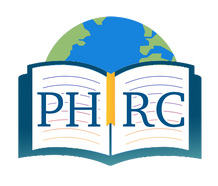
Planetary Health Report Card
UM, Spring 2022
The Planetary Health Report Card is an international, student-drive, metric-based initiative to inspire planetary health and sustainable healthcare education engagement in medical schools.
For more about the planetary health report card, visit: http://phreportcard.org
In April, Montana Student Health Professionals for a Healthy Climate, with the support an leadership of our faculty mentor Hayley Blackburn, completed a planetary health report card (PHRC) assessment for the pharmacy school at the University of Montana. The purpose of these assessments was to determine the degree to which the pharmacy school currently engages with communities most affected by climate change and environmental injustice as well as see to what degree the school currently advocates for sustainable healthcare practices through its curriculum to reduce environmental waste.
Leaders from the nation-wide PHRC initiative assessed the University of Montana’s submission and provided UM’s pharmacy school with a letter grade of “B –" for its various planetary health and climate change oriented coursework and initiatives.
To read the full planetary health report card for the University of Montana, visit:
http://phreportcard.org/pharmacy-pilot/
UM, Spring 2022
The Planetary Health Report Card is an international, student-drive, metric-based initiative to inspire planetary health and sustainable healthcare education engagement in medical schools.
For more about the planetary health report card, visit: http://phreportcard.org
In April, Montana Student Health Professionals for a Healthy Climate, with the support an leadership of our faculty mentor Hayley Blackburn, completed a planetary health report card (PHRC) assessment for the pharmacy school at the University of Montana. The purpose of these assessments was to determine the degree to which the pharmacy school currently engages with communities most affected by climate change and environmental injustice as well as see to what degree the school currently advocates for sustainable healthcare practices through its curriculum to reduce environmental waste.
Leaders from the nation-wide PHRC initiative assessed the University of Montana’s submission and provided UM’s pharmacy school with a letter grade of “B –" for its various planetary health and climate change oriented coursework and initiatives.
To read the full planetary health report card for the University of Montana, visit:
http://phreportcard.org/pharmacy-pilot/
UM STUDENTS APRIL 2022
Climate Bike Ride and Volunteer Day
In April, the Montana Student Health Professionals for a Healthy Climate organized a climate bike ride/volunteer day. A small group of University of Montana students met on campus and biked to Soil Cycle and Free Cycles for a fun and engaging day of volunteer work. At Soil Cycle our team spent the morning shifting and sorting compost, along with assisting the Soil Cycle team with preparing bags of compost for delivery.
Climate Bike Ride and Volunteer Day
In April, the Montana Student Health Professionals for a Healthy Climate organized a climate bike ride/volunteer day. A small group of University of Montana students met on campus and biked to Soil Cycle and Free Cycles for a fun and engaging day of volunteer work. At Soil Cycle our team spent the morning shifting and sorting compost, along with assisting the Soil Cycle team with preparing bags of compost for delivery.
About Soil Cycle: www.soilcyclemissoula.com
|
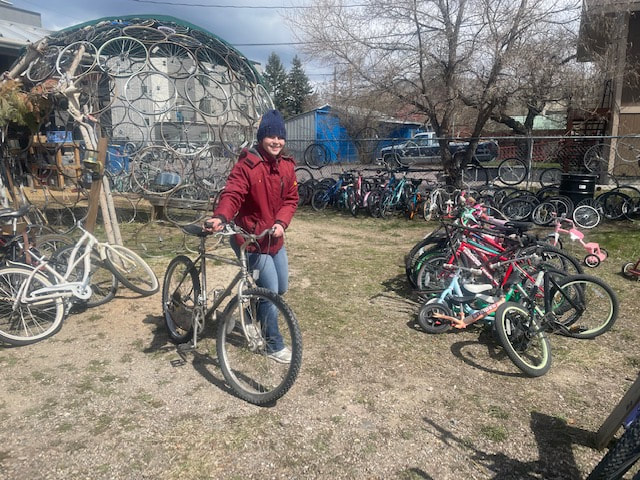 A Montana Student Health Professional at Free Cycles.
A Montana Student Health Professional at Free Cycles.
About Free Cycles: www.freecycles.com
The Free Cycles Community Bike Shop in Missoula focuses on reusing and repurposing bicycles to reduce pollution and promote social change and empowerment.
Stay tuned for more updates from our students!
The Free Cycles Community Bike Shop in Missoula focuses on reusing and repurposing bicycles to reduce pollution and promote social change and empowerment.
Stay tuned for more updates from our students!

